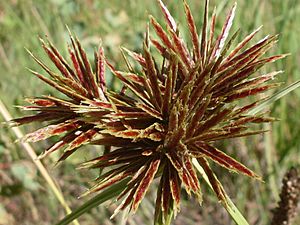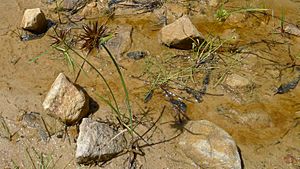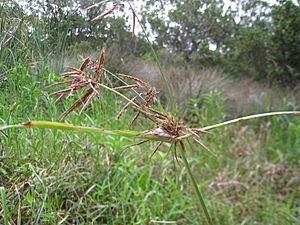Dense flat-sedge facts for kids
Quick facts for kids Dense flat-sedge |
|
|---|---|
 |
|
| Cyperus congestus inflorescence, near Glen Innes, NSW, Australia | |
| Scientific classification | |
| Genus: |
Cyperus
|
| Species: |
congestus
|
| Synonyms | |
|
Mariscus congestus (Vahl) C.B.Clarke |
|
The Cyperus congestus, also known as dense flat-sedge or clustered flat-sedge, is a type of plant. It belongs to the Cyperaceae family, which includes many grass-like plants called sedges. This plant originally comes from southern Africa, mainly South Africa, Lesotho, and Namibia.
Contents
What Does It Look Like?
This plant is a perennial sedge, meaning it lives for more than two years. It usually grows to about 1 meter (3 feet) tall. It grows in a "tufted" way, meaning many stems grow closely together from one spot.
Stems and Leaves
The stems, called culms, are smooth and shaped like a triangle. They are often pink-red near the bottom. The leaves are about 4 to 8 millimeters (0.16 to 0.31 inches) wide. They have ridges and a deep groove down the middle.
Flowers and Seeds
The plant blooms between July and March, producing brown flowers. Each stem can have two to seven flower clusters, called inflorescences. These clusters are made of up to 20 smaller, reddish-brown spikelets. Each spikelet is about 10 to 28 millimeters (0.39 to 1.1 inches) long.
After the plant flowers, it forms small, dark brown-black seeds. These seeds are shaped like a narrow oval and are about 1.5 millimeters (0.06 inches) long. They are about 0.6 millimeters (0.02 inches) wide.
Underground Parts
The dense flat-sedge has a short rhizome. A rhizome is an underground stem that connects different parts of the plant. It helps the plant spread and grow in new places.
How It Got Its Name
Scientists give every living thing a special two-part name. This helps everyone know exactly which plant or animal they are talking about.
Naming the Plant
The Cyperus congestus was first officially described in 1805. A botanist named Martin Vahl gave it its scientific name. He wrote about it in his work called Enumeratio Plantarum. Sometimes, people mistakenly call this plant Cyperus polystachyos.
Meaning of the Name
The second part of its name, congestus, comes from Latin. It means "crowded." This name probably refers to how closely the seeds are packed together along the spikelet. The only other name for this plant is Mariscus congestus. This name was given by another scientist, C.B.Clarke.
Where Does It Grow?
The dense flat-sedge is very good at spreading. It has been brought to other parts of the world, like Australia, where it now grows naturally.
In Australia
In Western Australia, this plant is considered a weed. It grows in wet areas like swamps and around creeks. You can find it in coastal parts of the Wheatbelt, Peel, South West, Great Southern, and Goldfields-Esperance regions. It prefers sandy-clay soils.
This sedge also grows in coastal areas of New South Wales, Victoria, South Australia, and Tasmania. It is also found around Brisbane in Queensland.
Other Places
Beyond Australia, the dense flat-sedge is also a common weed in New Zealand and Hawaii.



